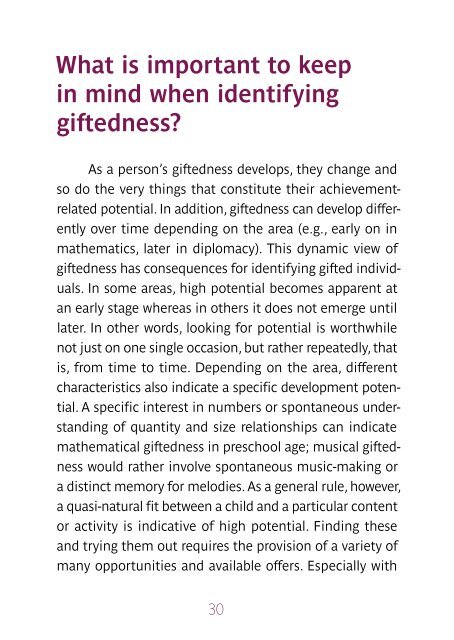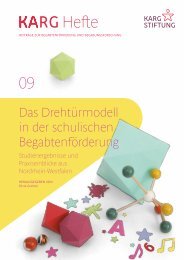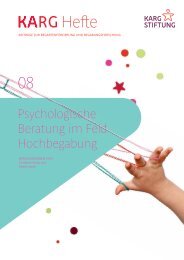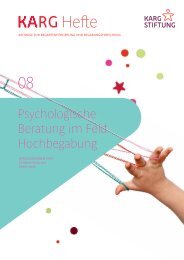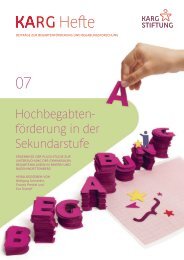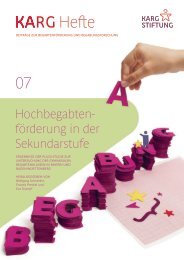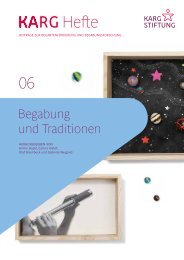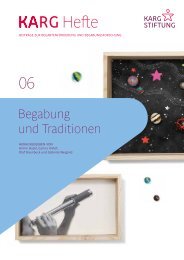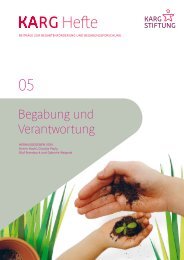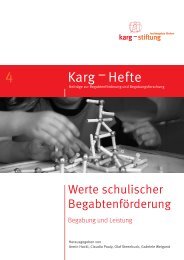FAQS: Frequently asked questions about giftedness
The Karg Foundation receives a lot of questions on the subject of giftedness—FAQs (Frequently Asked Questions)—far more often indeed than it did ten years ago. And this is a good thing! Many people involved in the educational processes of children have come to realize that giftedness can also be a fundamental personality trait of children and adolescents. The Karg Foundation wants to answer the questions you may have not only as educational and psychological professionals in educational institutions or working as educational providers, policy makers, or in training and further education institutes, but as parents and gifted people also: What is giftedness? How can it be identified? Who can provide advise for gifted children and their families? How can they be supported in the best possible way?
The Karg Foundation receives a lot of questions on the subject of giftedness—FAQs (Frequently Asked Questions)—far more often indeed than it did ten years ago. And this is a good thing! Many people involved in the educational processes of children have come to realize that giftedness can also be a fundamental personality trait of children and adolescents.
The Karg Foundation wants to answer the questions you may have not only as educational and psychological professionals in educational institutions or working as educational providers, policy makers, or in training and further education institutes, but as parents and gifted people also: What is giftedness? How can it be identified? Who can provide advise for gifted children and their families? How can they be supported in the best possible way?
Create successful ePaper yourself
Turn your PDF publications into a flip-book with our unique Google optimized e-Paper software.
What is important to keep<br />
in mind when identifying<br />
<strong>giftedness</strong>?<br />
As a person’s <strong>giftedness</strong> develops, they change and<br />
so do the very things that constitute their achievementrelated<br />
potential. In addition, <strong>giftedness</strong> can develop differently<br />
over time depending on the area (e.g., early on in<br />
mathematics, later in diplomacy). This dynamic view of<br />
<strong>giftedness</strong> has consequences for identifying gifted individuals.<br />
In some areas, high potential becomes apparent at<br />
an early stage whereas in others it does not emerge until<br />
later. In other words, looking for potential is worthwhile<br />
not just on one single occasion, but rather repeatedly, that<br />
is, from time to time. Depending on the area, different<br />
characteristics also indicate a specific development potential.<br />
A specific interest in numbers or spontaneous understanding<br />
of quantity and size relationships can indicate<br />
mathematical <strong>giftedness</strong> in preschool age; musical <strong>giftedness</strong><br />
would rather involve spontaneous music-making or<br />
a distinct memory for melodies. As a general rule, however,<br />
a quasi-natural fit between a child and a particular content<br />
or activity is indicative of high potential. Finding these<br />
and trying them out requires the provision of a variety of<br />
many opportunities and available offers. Especially with<br />
young children, providing these opportunities is often<br />
more important than identifying potential in children—<br />
according to the motto “first provide opportunities and<br />
encourage, then identify”. As a child then gravitates toward<br />
a particular subject or area, learning ability becomes more<br />
important. In terms of recognition, this means paying<br />
attention not only to cognitive abilities, but also to prior<br />
knowledge, learning strategies, or the child’s motivation.<br />
Is the child confident <strong>about</strong> learning? Can he or she cope<br />
well with failure? All of these factors are important for<br />
further development. At a later stage, creativity, self-regulatory<br />
skills such as the ability to set goals and plan one’s<br />
own learning, and social skills emerge. Thus, for the identification<br />
of <strong>giftedness</strong>, many characteristics play a role,<br />
and their respective significance can shift in the course of<br />
<strong>giftedness</strong> development. In this view, diagnosing <strong>giftedness</strong><br />
is thus understood as a process.<br />
30<br />
31


